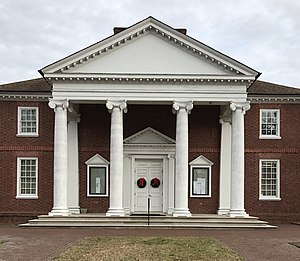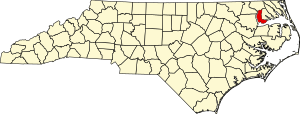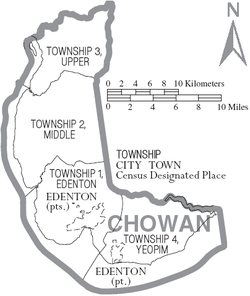Chowan County, North Carolina
Chowan County | |
|---|---|
 | |
 Location within the U.S. state of North Carolina | |
 North Carolina's location within the U.S. | |
| Coordinates: 36°08′N 76°36′W / 36.13°N 76.60°W | |
| Country | |
| State | |
| Founded | 1668 |
| Named for | Chowanoke Indian Tribe |
| Seat | Edenton |
| Largest community | Edenton |
| Area | |
• Total | 233.65 sq mi (605.2 km2) |
| • Land | 172.66 sq mi (447.2 km2) |
| • Water | 60.99 sq mi (158.0 km2) 26.10% |
| Population (2020) | |
• Total | 13,708 |
• Estimate (2023) | 13,891 |
| • Density | 79.39/sq mi (30.65/km2) |
| Time zone | UTC−5 (Eastern) |
| • Summer (DST) | UTC−4 (EDT) |
| Congressional district | 1st |
| Website | www |
Chowan County (/tʃoʊˈwɒn/ choh-WON)[1] is one of the 100 counties located in the U.S. state of North Carolina. As of the 2020 census, the population was 13,708.[2] Its county seat is Edenton.[3] The county was created between 1668 and 1671 as Shaftesbury Precinct and later renamed Chowan Precinct. It gained county status in 1739.[4][5]
History

Chowan was formed in 1670 as a precinct, originally called Shaftesbury, in Albemarle County. By 1685 it had been renamed for the Chowan Indian tribe, which lived in the northeastern part of the Carolina Colony.
Chowan County is in the northeastern section of the State and is bounded by Albemarle Sound, Chowan River, and the counties of Bertie, Hertford, Gates, and Perquimans. The present land area is 172.64 square miles and the 2000 population was 14,150.
In 1720, Edenton, which was named in honor of Governor Charles Eden, was established. In 1722 it was designated, and has continued to be, the county seat.[6]
During the American Civil War, the Albemarle Artillery was recruited in 1862 from Chowan and Tyrrell men at Edenton by local attorney William Badham, Jr. After cannons were recast from bronze donated as bells from local courthouses and churches to arm the battery, the unit was renamed the Edenton Bell Battery. They named their cannon: Columbia, St. Paul, Fannie Roulac, and Edenton. Two of the guns, long thought lost, have been returned to Edenton in recent years. The St. Paul and the Edenton now can be seen on display at Edenton's waterfront park.[7] The county was named after the historical Chowanoc American Indian tribe, also called Chowan.[8][9]
Geography

According to the U.S. Census Bureau, the county has a total area of 233.65 square miles (605.2 km2), of which 172.66 square miles (447.2 km2) is land and 61.99 square miles (160.6 km2) (26.10%) is water.[10] It is the smallest county in North Carolina by land area and third-smallest by total area.
State and local protected sites
Major water bodies
Adjacent counties
- Gates County – north
- Perquimans County – east
- Tyrrell County – southeast
- Washington County – south
- Bertie County – west
- Hertford County – northwest
Major highways
Major infrastructure
Demographics
| Census | Pop. | Note | %± |
|---|---|---|---|
| 1790 | 4,988 | — | |
| 1800 | 5,132 | 2.9% | |
| 1810 | 5,297 | 3.2% | |
| 1820 | 6,464 | 22.0% | |
| 1830 | 6,697 | 3.6% | |
| 1840 | 6,690 | −0.1% | |
| 1850 | 6,721 | 0.5% | |
| 1860 | 6,842 | 1.8% | |
| 1870 | 6,450 | −5.7% | |
| 1880 | 7,900 | 22.5% | |
| 1890 | 9,167 | 16.0% | |
| 1900 | 10,258 | 11.9% | |
| 1910 | 11,303 | 10.2% | |
| 1920 | 10,649 | −5.8% | |
| 1930 | 11,282 | 5.9% | |
| 1940 | 11,572 | 2.6% | |
| 1950 | 12,540 | 8.4% | |
| 1960 | 11,729 | −6.5% | |
| 1970 | 10,764 | −8.2% | |
| 1980 | 12,558 | 16.7% | |
| 1990 | 13,506 | 7.5% | |
| 2000 | 14,526 | 7.6% | |
| 2010 | 14,793 | 1.8% | |
| 2020 | 13,708 | −7.3% | |
| 2023 (est.) | 13,891 | [2] | 1.3% |
| U.S. Decennial Census[11] 1790–1960[12] 1900–1990[13] 1990–2000[14] 2010[15] 2020[2] | |||
2020 census
| Race | Number | Percentage |
|---|---|---|
| White (non-Hispanic) | 8,268 | 60.32% |
| Black or African American (non-Hispanic) | 4,376 | 31.92% |
| Native American | 43 | 0.31% |
| Asian | 39 | 0.28% |
| Pacific Islander | 1 | 0.01% |
| Other/Mixed | 451 | 3.29% |
| Hispanic or Latino | 530 | 3.87% |
As of the 2020 census, there were 13,708 people, 6,133 households, and 3,986 families residing in the county.
2010 census
At the 2010 census[17] there were 14,793 people, 5,580 households, and 4,006 families residing in the county. The population density was 84 people per square mile (32 people/km2). There were 6,443 housing units at an average density of 37 units per square mile (14 units/km2). The racial makeup of the county was 62.0% White, 34.3% Black or African American, 0.3% Native American, 0.4% Asian, 0.0% Pacific Islander, 1.8% from other races, and 1.2% from two or more races. 3.2% of the population were Hispanic or Latino of any race.
There were 5,580 households, out of which 30.30% had children under the age of 18 living with them, 53.00% were married couples living together, 15.70% had a female householder with no husband present, and 28.20% were non-families. 25.30% of all households were made up of individuals, and 12.10% had someone living alone who was 65 years of age or older. The average household size was 2.48 and the average family size was 2.94.
In the county, the population was spread out, with 23.90% under the age of 18, 9.60% from 18 to 24, 24.10% from 25 to 44, 24.40% from 45 to 64, and 17.90% who were 65 years of age or older. The median age was 40 years. For every 100 females there were 88.10 males. For every 100 females age 18 and over, there were 84.60 males.
The median income for a household in the county was $30,928, and the median income for a family was $36,986. Males had a median income of $29,719 versus $19,826 for females. The per capita income for the county was $15,027. About 13.70% of families and 17.60% of the population were below the poverty line, including 25.50% of those under age 18 and 16.70% of those age 65 or over.
Government and politics
Chowan County is a member of the Albemarle Commission regional council of governments.
Chowan County is represented by Bobby Hanig in the 1st district of the North Carolina Senate.
| Year | Republican | Democratic | Third party(ies) | |||
|---|---|---|---|---|---|---|
| No. | % | No. | % | No. | % | |
| 2024 | 4,587 | 60.74% | 2,895 | 38.33% | 70 | 0.93% |
| 2020 | 4,471 | 57.44% | 3,247 | 41.71% | 66 | 0.85% |
| 2016 | 4,014 | 55.53% | 2,992 | 41.39% | 222 | 3.07% |
| 2012 | 3,891 | 51.85% | 3,556 | 47.38% | 58 | 0.77% |
| 2008 | 3,773 | 50.23% | 3,688 | 49.09% | 51 | 0.68% |
| 2004 | 2,967 | 55.09% | 2,406 | 44.67% | 13 | 0.24% |
| 2000 | 2,415 | 49.39% | 2,430 | 49.69% | 45 | 0.92% |
| 1996 | 1,659 | 38.80% | 2,239 | 52.36% | 378 | 8.84% |
| 1992 | 1,661 | 36.86% | 2,136 | 47.40% | 709 | 15.73% |
| 1988 | 1,884 | 51.56% | 1,756 | 48.06% | 14 | 0.38% |
| 1984 | 2,171 | 55.41% | 1,736 | 44.31% | 11 | 0.28% |
| 1980 | 1,424 | 38.91% | 2,146 | 58.63% | 90 | 2.46% |
| 1976 | 1,019 | 35.27% | 1,862 | 64.45% | 8 | 0.28% |
| 1972 | 1,906 | 66.39% | 936 | 32.60% | 29 | 1.01% |
| 1968 | 798 | 21.60% | 1,201 | 32.50% | 1,696 | 45.90% |
| 1964 | 787 | 31.70% | 1,696 | 68.30% | 0 | 0.00% |
| 1960 | 533 | 21.73% | 1,920 | 78.27% | 0 | 0.00% |
| 1956 | 556 | 27.24% | 1,485 | 72.76% | 0 | 0.00% |
| 1952 | 537 | 27.05% | 1,448 | 72.95% | 0 | 0.00% |
| 1948 | 124 | 9.73% | 1,070 | 83.99% | 80 | 6.28% |
| 1944 | 166 | 11.22% | 1,314 | 88.78% | 0 | 0.00% |
| 1940 | 87 | 5.32% | 1,547 | 94.68% | 0 | 0.00% |
| 1936 | 96 | 5.83% | 1,550 | 94.17% | 0 | 0.00% |
| 1932 | 64 | 3.75% | 1,639 | 95.96% | 5 | 0.29% |
| 1928 | 352 | 27.33% | 936 | 72.67% | 0 | 0.00% |
| 1924 | 98 | 12.00% | 714 | 87.39% | 5 | 0.61% |
| 1920 | 209 | 16.08% | 1,091 | 83.92% | 0 | 0.00% |
| 1916 | 91 | 12.96% | 610 | 86.89% | 1 | 0.14% |
| 1912 | 60 | 7.50% | 663 | 82.88% | 77 | 9.63% |
Communities

Town
- Edenton (county seat and largest community)
Townships
- Township 1, Edenton
- Township 2, Middle
- Township 3, Upper
- Township 4, Yeopim
Census-designated places
Other unincorporated places
See also
- List of counties in North Carolina
- National Register of Historic Places listings in Chowan County, North Carolina
- North Carolina v. Mann (1830), slave court case related to Chowan County
References
- ^ Talk Like A Tarheel Archived June 22, 2013, at the Wayback Machine, from the North Carolina Collection's website at the University of North Carolina at Chapel Hill. Retrieved February 8, 2013.
- ^ a b c "QuickFacts: Chowan County, North Carolina". United States Census Bureau. Retrieved March 21, 2024.
- ^ "Find a County". National Association of Counties. Archived from the original on May 9, 2015. Retrieved June 7, 2011.
- ^ "North Carolina: Individual County Chronologies". North Carolina Atlas of Historical County Boundaries. The Newberry Library. 2009. Archived from the original on March 4, 2016. Retrieved January 22, 2015.
- ^ Powell, William S. (2006). "Chowan County". NCpedia. University of North Carolina Press. Retrieved January 22, 2015.
- ^ "Chowan County, North Carolina | Learn | FamilySearch.org". Archived from the original on July 15, 2012.
- ^ "Edenton Bell Battery". Edenton Historical Commission. Archived from the original on July 26, 2011. Retrieved July 9, 2009.
- ^ "Chowan County Profile". Website. epodunk. Archived from the original on November 4, 2012. Retrieved February 19, 2010.
- ^ "Chowanoc Indian Tribe". Website. AccessGenealogy. Retrieved February 19, 2010.
- ^ "2020 County Gazetteer Files – North Carolina". United States Census Bureau. August 23, 2022. Retrieved September 9, 2023.
- ^ "U.S. Decennial Census". United States Census Bureau. Retrieved January 13, 2015.
- ^ "Historical Census Browser". University of Virginia Library. Archived from the original on August 11, 2012. Retrieved January 13, 2015.
- ^ Forstall, Richard L., ed. (March 27, 1995). "Population of Counties by Decennial Census: 1900 to 1990". United States Census Bureau. Retrieved January 13, 2015.
- ^ "Census 2000 PHC-T-4. Ranking Tables for Counties: 1990 and 2000" (PDF). United States Census Bureau. April 2, 2001. Archived (PDF) from the original on March 27, 2010. Retrieved January 13, 2015.
- ^ "State & County QuickFacts". United States Census Bureau. Archived from the original on June 6, 2011. Retrieved October 18, 2013.
- ^ "Explore Census Data". data.census.gov. Retrieved December 23, 2021.
- ^ "U.S. Census website". United States Census Bureau. Retrieved January 31, 2008.
- ^ Leip, David. "Dave Leip's Atlas of U.S. Presidential Elections". uselectionatlas.org. Retrieved March 15, 2018.
Further reading
- "Chowan County", Branson's North Carolina Business Directory...1867-68, Raleigh, NC: Branson & Jones, p. 29 – via hathitrust.org
- "Chowan County", Branson's North Carolina Business Directory, 1896, Raleigh, NC: Levi Branson, p. 185 – via archive.org
- "Chowan County", North Carolina Year Book and Business Directory, 1916, Raleigh, N.C.: News and Observer Publishing Company – via hathitrust.org
- Newcomer, Mabel. Economic and Social History of Chowan County, North Carolina, 1880–1915 (1917)
External links
 Geographic data related to Chowan County, North Carolina at OpenStreetMap
Geographic data related to Chowan County, North Carolina at OpenStreetMap- Official website



